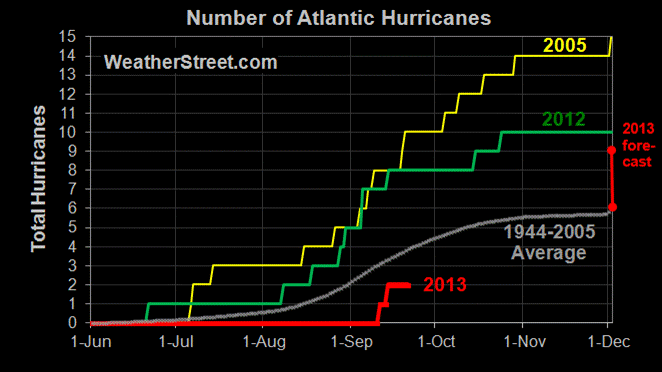
I believe it was either the hyper-hurricane season of 2005, or the hurricane-drought year of 2006, when my sister living the the Florida Keys complained that the National Hurricane Center shouldn’t even be making seasonal outlooks of hurricane activity.
I defended the NHC outlooks, saying that they do, after all, have some small level of skill. But with this year’s hurricane season shaping up to be another ‘drought’ when ‘floods’ of hurricanes were forecast, I’m beginning to think she had a point. Even if there is “some” skill in forecasting how many hurricanes will form in the entire Atlantic basin, there is no way to know weeks or months in advance where they will hit land, if at all.
In my sister’s case, she and her husband built a nearly hurricane-proof house in Summerland Key, and they were pummeled relentlessly in 2005. Thinking that they needed a safer place to park their sailboat when hurricane season arrives, they then built another coastal house in North Carolina, well west of Cape Hatteras safely tucked up in Pamlico Sound.
Well, guess what happened? Hurricanes stopped hitting the Keys…and instead a hurricane nailed their NC house. So much for planning in advance.
Now, I don’t really think the NHC will ever stop making hurricane season outlooks. I have been told the apparently true story of an U.S. Army Air Force general in World War II who needed a weather forecast weeks in advance, but was told the forecast would have no skill. The general understood that, but needed the forecast “for planning purposes” anyway.
Maybe we can say the same thing about economic forecasts, which also have little skill. People know that have little skill, but make decisions based upon them anyway.
And let’s not forget the IPCC’s super-long-range forecasts of global warming, or climate change, or climate disruption, or whatever they are calling it these days.
I gave an invited talk at a conference of economists a couple years ago, and was struck by how well those on opposite sides of the economic philosophy spectrum got along with each other. I mentioned how antagonistic climate alarmists and skeptics are to one another, and asked why the economists managed to get along so well? I was told that they had all been proved wrong so many times that they had been sufficiently humbled by their experiences.
I can only hope that we are seeing the beginnings of something similar in the climate research community. We skeptics have been saying for years, in effect, “you know, we really don’t know enough about the response of the climate system to be predicting what adding 1 or 2 molecules of CO2 to 10,000 molecules of air is going to do, if anything.”
Warming has stopped. Who would have ever predicted that — except a skeptic?
The IPCC admits they have little confidence in how hurricanes might change with warming. No measures of severe weather, with the possible exception of locally heavy rainfall, have been demonstrated to have changed with warming.
Like hurricane activity, what we can be sure of is that every year, more likely than not, will be different than the previous year. The U.S. will see record warmth one year, then record cold the next. Weather will change, and climate will change.
What direction will it change? Well, you can either spend billions of coins on research to find out, or you can flip one of those coins. The level of skill might well be about the same.
But who needs skill? We need forecasts and outlooks and projections…”for planning purposes”.

 Home/Blog
Home/Blog



